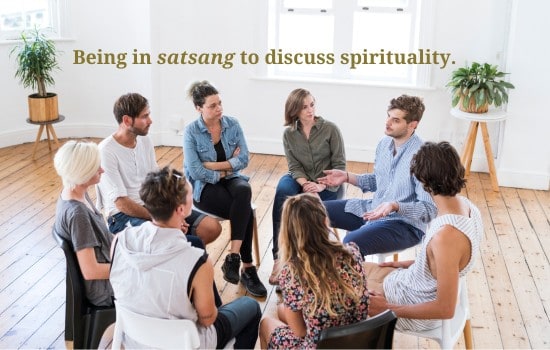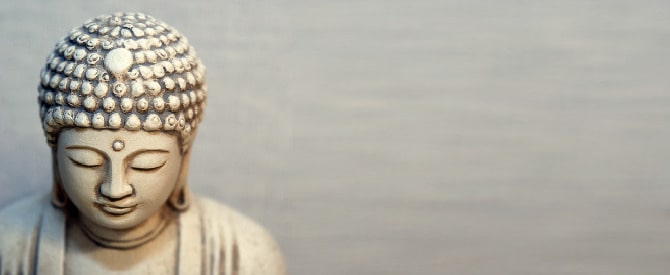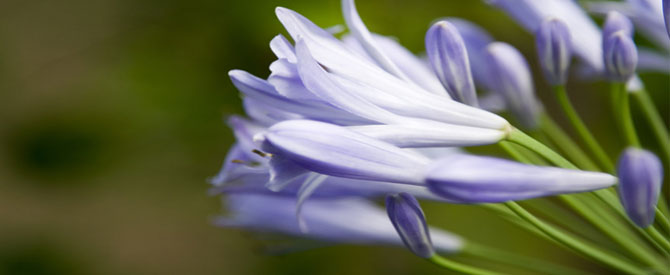Let’s say that you realise that you need to get fit and decide to start exercising regularly. You buy a membership at a gym close by and you are looking forward to using their saltwater swimming pool and attending some of their classes such as yoga, Pilates and meditation.
After a few months of enthusiastic participation, you begin to lose your motivation, stop swimming and attend the classes only sporadically.
This is similar to what happens when you embark on your spiritual path. You start with good intentions to wake up early, read and reflect on some spiritual books and meditate daily.
You know it’s the right thing to do but after some time, you lose your momentum because your interest dwindles and too many other things take over your day.
In the language of the spiritual philosophy of Vedanta, it can be said that there wasn’t enough dispassion for worldly things and a corresponding passion for your spiritual pursuits.
What is dispassion and why is it essential to our spiritual growth?
Vedanta describes dispassion as a lack of desire or interest in wanting to acquire and enjoy things, beings and circumstances.
Hmm . . . Does this mean giving up all the things and people that we enjoy and live a dull and empty life? If we give everything up, what else would there be to do and enjoy?
Dispassion sounds awfully dreary, doesn’t it? The very idea of dispassion itself seems out of place in today’s world where materialism is championed and adored.
I’m certainly not qualified to advocate and advice on dispassion when I am nowhere close to giving everything up and living a monk-like life.
However, I am a sincere spiritual seeker, wanting to learn, grow and be happier in life. If you are like me, how can dispassion for worldly things help us in our inner growth?
 First, it’s important to understand that there are only two areas of life in which we can reap happiness: the world and the Self.
First, it’s important to understand that there are only two areas of life in which we can reap happiness: the world and the Self.
In other words, through the outer world of things, beings and situations, or our inner Self, through the path of spirituality.
Swami Tejomayananda, master of Vedanta, tells us that focusing on our spiritual pursuits and spiritual evolution is the path to real happiness.
Here’s why: When we put our entire focus on pursuing happiness by fulfilling our desires in the outer world, we observe that we don’t always get what we want, when we want it and exactly as we want it. Even when we do get it, our happiness doesn’t last as the world, our minds and desires are all constantly changing. On top of it all, we leave everything behind when we die.
Since we didn’t put in efforts to promote our spiritual growth while we were alive, we didn’t accrue any gains there. And so, both worldly and spiritual gains are lost.
Whereas when we put in efforts to evolve spiritually, we take those inner gains in subtle form when we leave our present body to our next embodiment.
Yes, we are reborn. Only the body dies. The subtle aspects of our personality—the lessons and inner growth we achieve continue as impressions in our next birth. Our spiritual journey continues from where we left off.
Vedanta tells us that we will keep coming back again and again until we fulfil the ultimate purpose of life—realising our divine Self.
The Self is the real source of happiness as its very nature is bliss and love. In and through all our attempts at seeking happiness from the world, we are actually seeking to regain our innate nature of fullness and bliss.
When we are ready to turn our attention away from seeking happiness in the outer world and begin seeking it within ourselves, we will begin our evolutionary journey to the Self. Maintaining our attention on gaining happiness through everyday pleasures, people, and situations keeps us from turning within.
Since our ultimate purpose is spiritual evolution, cultivating dispassion for the world is essential.
How can we begin to develop dispassion?
How to develop dispassion
Gain spiritual knowledge through satsang
We will not have any interest or enthusiasm to walk the spiritual path unless we understand the preciousness of our human life and the unique ability to promote our own spiritual evolution.
The daily habit that will keep us in touch with our spiritual goals is satsang (Sanskrit), which means “being in spiritual company.”
It is through satsang that we gain knowledge of our essential divine nature. Satsang provides us with inspiration to stay on our spiritual path and the means to promote our inner growth.
We are in satsang when we study the spiritual literature of the world’s major world religions.
We partake of satsang when we learn spirituality directly from spiritual teachers, listen to their talks, or read their books.
 And when we discuss spirituality with other like-minded people, we are also being in satsang.
And when we discuss spirituality with other like-minded people, we are also being in satsang.
Group of people being in satsang to discuss spirituality and spiritual topics such as dispassion.
The knowledge that we gain from regular satsang gives us a higher spiritual perspective that helps us shift our thinking and priorities towards our spiritual growth and develop dispassion for worldly pursuits. Satsang is the very first and essential step on our spiritual journey.
Begin to question our pursuits
 If we don’t start to think about life and question our everyday pursuits and priorities, we will continue to live as we are now.
If we don’t start to think about life and question our everyday pursuits and priorities, we will continue to live as we are now.
We will continue to hold on to the dim hope that we will someday gain complete fulfillment from the outer world of things, beings and circumstances.
But this is both unreasonable and impossible. Why?
It’s the nature of the world to be constantly in a state of flux. Even if we do get the perfect result that we desire, the joy we gain quickly begins to diminish.
As much as we try to hold on to that perfect moment, it slips away, yielding to the next moment in time which brings a fresh set of circumstances outside, and a new flow of thoughts and desires within.
Photos or videos of that perfect moment capture only a few short instants lost in time. The synergy of the perfect alignment of people, things, circumstances and mood of the moment that occurred will never return.
To repeat that experience of joy, we start searching for it in other ways. If we find it, we are happy—for some time that is, until things change, and the search for happiness begins all over again.
What’s strange is that even though we never find the thing, person, place, or situation that will keep us permanently happy, we never stop looking for it. We seem to be convinced that the perfect happiness is out there.
The truth is that real happiness isn’t “out there” but “in here” within us. It is our very own true nature. But because we don’t know it, we continue looking outwards.
To break this never-ending quest for happiness in the outer world, we must stop to think, re-evaluate our pursuits and priorities and look in the only other place there is—inside us.
Through this re-evaluation of our lives, we gradually develop dispassion for our usual pursuits.
Gradually reduce the dependency on outer things and beings for our happiness
The Self, our own nature is the only true source of happiness. Pegging our happiness on the outer world only brings us further away from the enduring happiness that we are really searching for.
We are like the old woman in the story of the lost needle, who was searching for it outside her house when she had dropped it inside. Seeing the woman searching for her needle outside her house, some people came to help her find it. When they couldn’t find it anywhere and learned that she had dropped it inside her house, they became angry and thought she had gone mad. The old woman, who was wiser than people thought she was, chided them, “You think I’m mad? Aren’t you mad searching for happiness outside when it is inside you?”
This is indeed a difficult truth to accept. The outer world is temptingly beautiful with an infinite variety of things to enjoy. How can happiness be inside us? As someone once told me, “It’s no fun closing my eyes and going inside. All the fun is on the outside!”
How do we start to cultivate dispassion and begin the search within? We can begin by gradually reducing our desires and dependency on things for our sense of well-being and happiness.
We must reflect on the fact that desires disturb the mind. Once a desire arises, it nags at us and takes away our focus from other things. It doesn’t go away until we fulfill it.
Think about having a morning cup of tea or coffee. Many people say they can’t function until they get their morning boost.
If I become disgruntled and can’t function without my morning cup of coffee, I have allowed myself to become a slave to my own senses and body. I no longer have the freedom to choose what I want.
Here’s how this downfall happens . . .
 When we fulfill a desire and gain the pleasurable experience we want, the memory of that pleasure stays with us afterwards as a subtle impression in the mind.
When we fulfill a desire and gain the pleasurable experience we want, the memory of that pleasure stays with us afterwards as a subtle impression in the mind.
If we repeat the experience or even just repeat the memory of that experience in our mind, it deepens into a tendency.
Once the impression solidifies as a tendency, it cannot be overcome very easily. It erupts as a desire that agitates the mind.
To end the mental agitation caused by the desire, we take action to fulfil it. When we do, the tendency is strengthened, and the slavish cycle starts all over again:
desire –> mental agitation –> action–> strengthening of tendency –> desire –> mental agitation –> action–> strengthening of tendency . . . ad infinitum.
From this it becomes easier to understand why we must gradually wean ourselves off our dependency on things.
When we begin to free ourselves from their grip, we can then re-direct our attention on higher and nobler goals and our spiritual growth.
Spiritual pursuits provide subtler joys that are neither driven nor dependent on the senses but motivated by higher ideals and motives.
For example, to gain the inner peace, clarity and strength that comes from your early morning spiritual practice, you readily sacrifice staying up late to watch television.
In his book, Bhaja Govindam (Seek the Truth) Vedantic master, Adi Shankaracharya advises us to renounce desires as they are insatiable. No matter how much we feed our senses, they can never have enough. We may have to stop because the stomach is full, or the body is drained. But the senses never tire.
If most of our time and energy is spent in fulfilling sensual desires, where is there the time or mental space to focus on our spiritual pursuits?
Therefore, we must develop dispassion and slowly start to look within for the source of real happiness.
Cultivate noble virtues
On the spiritual path, we are striving to bring out and live our innate divinity. For this we must nurture positive character traits and virtues within ourselves. These are qualities of the head and the heart that are universally accepted as good, right and noble.
 Examples are compassion, honesty, ahimsa (non-injury to others in thought, word or deed), patience, tolerance, acceptance, and forgiveness. These are qualities that we need when interacting with others.
Examples are compassion, honesty, ahimsa (non-injury to others in thought, word or deed), patience, tolerance, acceptance, and forgiveness. These are qualities that we need when interacting with others.
And, there are other qualities that we must develop that need not be demonstrated or displayed to others. Examples are control of the mind and senses, the ability to withdraw from distractions and focus on the work at hand, purity or cleanliness (inner and outer), faith in God, our guru and the spiritual goal (the Self), daily self-study, reflection, and meditation.
To develop these qualities, we must make time and create space in our lives for this unfoldment to occur. It cannot come when we are fully preoccupied with activities and concerns in the outer world. A certain level of dispassion is a must.
Cultivate dispassion and begin our spiritual journey
Nothing in the world is permanent. All things and beings, joys and sorrows appear and disappear like waves in the ocean. They stay for some time and then pass away.
What we are really seeking is the highest fulfillment in life—the bliss of our own true Self. Our desires for the world keep us looking outside, chasing impermanent and unsatisfactory joys.
 Let’s start cultivating dispassion and begin seeking within ourselves. There’s no better time than now to embark on our spiritual journey.
Let’s start cultivating dispassion and begin seeking within ourselves. There’s no better time than now to embark on our spiritual journey.
As my guru, Swami Chinmayananda says, “In life, we cannot expect to be completely free of worldly entanglements; to wait for such a time before we undertake the spiritual path is absurd. It is like waiting for the waves to subside before taking a swim in the sea.”
Like this post? Sign up for the free fortnightly Spiritual Solutions Newsletter and receive the latest articles, news and updates in your email inbox!














Thinking about this… Shifting focus from material desires to inner fulfillment would promote deeper emotional resilience and compassion in our communities. People would likely be less competitive and more collaborative, fostering greater harmony and meaningful connections.
Yes, I agree! Thank you for your insightful reflections.